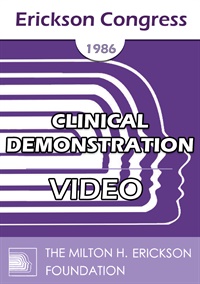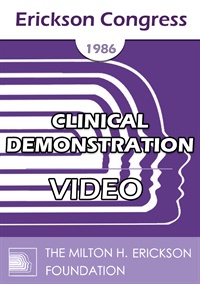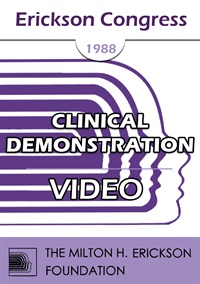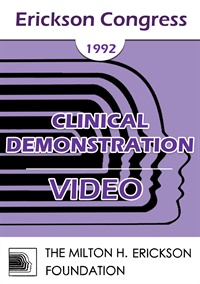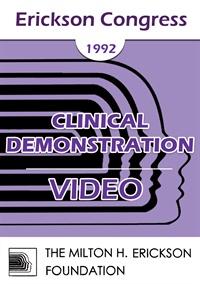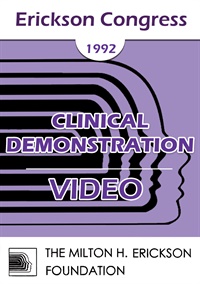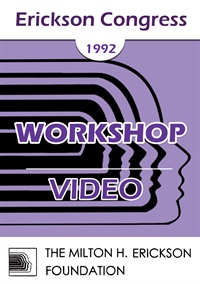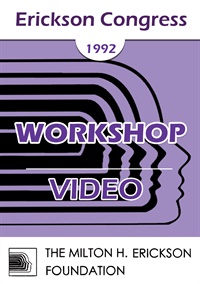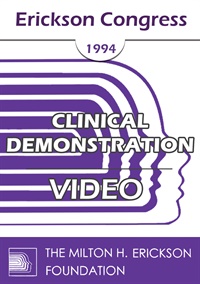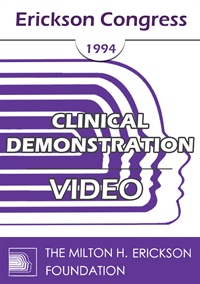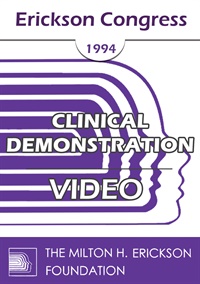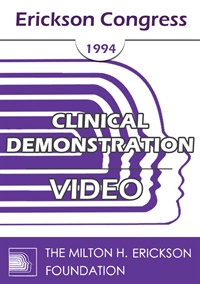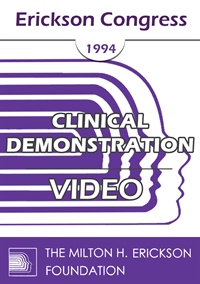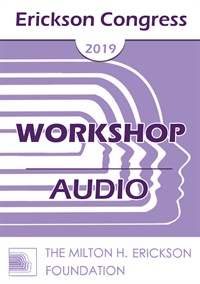
- Average Rating:
- Not yet rated
- Topic Areas:
- Workshops | Core Competencies of Ericksonian Therapy | Ericksonian Hypnosis and Therapy Techniques | Hypnosis
- Categories:
- Erickson Congress | Erickson Congress 2019
- Faculty:
- Dan Short, PhD
- Duration:
- 1 Hour 57 Minutes
- Format:
- Audio Only
- Original Program Date:
- Dec 15, 2019
- Short Description:
- Recently a set of core competencies was identified and endorsed by a majority of the leading figures in Ericksonian therapy. These key concepts have been subjected to empirical testing and found to be pivotal to the identity of this unique form of therapy. Dan Short, author of the recently released Core Competencies Manual for Ericksonian Therapy, will provide an overview of this wealth of information.
- Price:
- $15.00 - Base Price
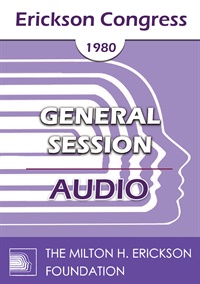
- Average Rating:
- Not yet rated
- Topic Areas:
- General Sessions | Hypnosis
- Categories:
- Erickson Congress | Erickson Congress 1980
- Faculty:
- Marion R Moore, MD | Stephen Gilligan, PhD | Moris Kleinhauz, MD
- Duration:
- 2:11:29
- Format:
- Audio Only
- Original Program Date:
- Dec 05, 1980
- Short Description:
- IC80 General Session 01 - Hypnosis - Marion Moore, MD, Stephen Gilligan, Ph.D, Moris Kleinhauz, MD
- Price:
- $15.00 - Base Price
Tags: Hypnosis Stephen Gilligan
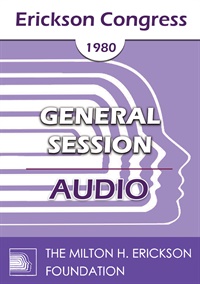
- Average Rating:
- Not yet rated
- Topic Areas:
- General Sessions | Psychotherapy | Hypnosis | Neuroscience | Research
- Categories:
- Erickson Congress | Erickson Congress 1980
- Faculty:
- David Akstein, MD | Lars-Eric Unestahl, PhD | Michal Vancura | Leonard J Ravitz, MD
- Duration:
- 3:01:25
- Format:
- Audio Only
- Original Program Date:
- Dec 06, 1980
- Short Description:
- This wide-ranging session traces the evolution of hypnotic theory and practice across Eastern Europe, from Pavlovian “partial sleep” models to more contemporary, active, and permissive approaches. Presenters review research on induction methods, ideomotor action, posthypnotic signaling, and spontaneous trance, along with cross-cultural clinical innovations in medicine, psychotherapy, and child treatment. Participants gain a rare historical and scientific overview of how hypnosis has been studied, taught, and applied in Czechoslovakia, the Soviet Union, East Germany, Poland, Hungary, and beyond.
- Price:
- $15.00 - Base Price
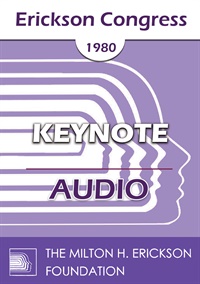
- Average Rating:
- Not yet rated
- Topic Areas:
- Keynotes | Family Therapy | Hypnosis
- Categories:
- Erickson Congress | Erickson Congress 1980 | Pioneers in Couples and Family Therapy
- Faculty:
- Carl Whitaker, MD
- Duration:
- 47:33
- Format:
- Audio Only
- Original Program Date:
- Dec 07, 1980
- Short Description:
- In this keynote, Whitaker explores family therapy by emphasizing therapist vulnerability, self-hypnosis, and authentic engagement while using co-therapy, regression techniques, and playful interventions to foster genuine healing.
- Price:
- $15.00 - Base Price
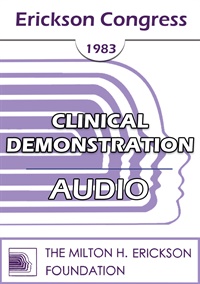
- Average Rating:
- Not yet rated
- Topic Areas:
- Clinical Demonstrations | Pain and Healing | Phenomenology | Hypnotic Phenomena | Trance | Hypnosis
- Categories:
- Erickson Congress 1983 | Erickson Congress
- Faculty:
- Stephen Lankton, MSW
- Duration:
- 58:48
- Format:
- Audio Only
- Original Program Date:
- Nov 28, 1983
- Short Description:
- IC83 Clinical Demonstration 27 - Clinical Use of Trance Phenomena for Therapy and Pain Control - Stephen R Lankton, ACSW
- Price:
- $15.00 - Base Price
- Average Rating:
- Not yet rated
- Topic Areas:
- Clinical Demonstrations | Affect | Hypnosis
- Categories:
- Erickson Congress | Erickson Congress 1986
- Faculty:
- Joseph Barber, PhD
- Course Levels:
- Master Degree or Higher in Health-Related Field
- Duration:
- 1:07:20
- Format:
- Audio and Video
- Original Program Date:
- Dec 05, 1986
- Short Description:
- IC86 Clinical Demonstration 04 - Hypnosis to Alter Affect - Joseph Barber, PhD
- Price:
- $29.00 - Base Price
- Average Rating:
- Not yet rated
- Topic Areas:
- Clinical Demonstrations | Family Therapy | Hypnosis
- Categories:
- Erickson Congress | Erickson Congress 1986
- Faculty:
- Stephen Lankton, MSW
- Course Levels:
- Master Degree or Higher in Health-Related Field
- Duration:
- 1:01:21
- Format:
- Audio and Video
- Original Program Date:
- Dec 05, 1986
- Short Description:
- IC86 Clinical Demonstration 06 - Family Therapy and Hypnosis - Stephen R Lankton, ACSW
- Price:
- $29.00 - Base Price
- Average Rating:
- Not yet rated
- Topic Areas:
- Clinical Demonstrations | Hypnosis | Psychotherapy
- Categories:
- Erickson Congress | Erickson Congress 1988
- Faculty:
- Joseph Barber, PhD
- Course Levels:
- Master Degree or Higher in Health-Related Field
- Duration:
- 1:01:47
- Format:
- Audio and Video
- Original Program Date:
- Dec 09, 1988
- Short Description:
- IC88 Clinical Demonstration 02 - Using Hypnosis in Psychotherapy - Joseph Barber, PhD
- Price:
- $29.00 - Base Price
Tags: Hypnosis Psychotherapy
- Average Rating:
- Not yet rated
- Topic Areas:
- Clinical Demonstrations | Dissociation | Hypnosis
- Categories:
- Erickson Congress | Erickson Congress 1992
- Faculty:
- Stephen Lankton, MSW
- Course Levels:
- Master Degree or Higher in Health-Related Field
- Duration:
- 55:58
- Format:
- Audio and Video
- Original Program Date:
- Dec 04, 1992
- Short Description:
- IC92 Clinical Demonstration 12 - The Role of Association and Dissociation in Co-Creating Experience in Therapy - Stephen Lankton, MSW
- Price:
- $29.00 - Base Price
Tags: Dissociation Hypnosis
- Average Rating:
- Not yet rated
- Topic Areas:
- Clinical Demonstrations | Hypnosis
- Categories:
- Erickson Congress | Erickson Congress 1992
- Faculty:
- Stephen Gilligan, PhD
- Course Levels:
- Master Degree or Higher in Health-Related Field
- Duration:
- 58:54
- Format:
- Audio and Video
- Original Program Date:
- Dec 04, 1992
- Short Description:
- IC92 Clinical Demonstration 13 - Hypnosis as Possibility and Empowerment - Stephen Gilligan, Ph.D.
- Price:
-
Sale is $29.00
price reduced from Base Price - $59.00
Tags: Hypnosis
- Average Rating:
- Not yet rated
- Topic Areas:
- Clinical Demonstrations | Hypnosis | Hypnotherapy
- Categories:
- Erickson Congress | Erickson Congress 1992
- Faculty:
- Ernest Rossi, PhD
- Course Levels:
- Master Degree or Higher in Health-Related Field
- Duration:
- 1:00:20
- Format:
- Audio and Video
- Original Program Date:
- Dec 04, 1992
- Short Description:
- IC92 Clinical Demonstration 14 - A Sensitive Fail-Safe Approach to Therapeutic Hypnosis - Ernest Rossi, Ph.D.
- Price:
-
Sale is $29.00
price reduced from Base Price - $59.00
Tags: Hypnosis Hypnotherapy
- Average Rating:
- Not yet rated
- Topic Areas:
- Workshops | Family Therapy | Hypnotic Induction | Hypnosis
- Categories:
- Erickson Congress | Erickson Congress 1992
- Faculty:
- Camillo Loriedo, MD, PhD
- Course Levels:
- Master Degree or Higher in Health-Related Field
- Duration:
- 54:25
- Format:
- Audio and Video
- Original Program Date:
- Dec 02, 1992
- Short Description:
- IC92 Workshop 13a - Demonstrations I - Family Hypnotic Induction and Therapy - Camillo Loriedo, MD
- Price:
-
Sale is $29.00
price reduced from Base Price - $59.00
- Average Rating:
- Not yet rated
- Topic Areas:
- Workshops | Hypnotic Induction | Trance | Hypnosis
- Categories:
- Erickson Congress | Erickson Congress 1992
- Faculty:
- Betty Alice Erickson, MS, LPC, LMFT
- Course Levels:
- Master Degree or Higher in Health-Related Field
- Duration:
- 58:26
- Format:
- Audio and Video
- Original Program Date:
- Dec 02, 1992
- Short Description:
- IC92 Workshop 13b - Demonstrations I - Anatomy of Varied Formal Trance Inductions - Betty Alice Erickson, MS, LPC, LMFT
- Price:
-
Sale is $29.00
price reduced from Base Price - $59.00
Tags: Hypnosis Hypnotic Induction Trance
- Average Rating:
- Not yet rated
- Topic Areas:
- Workshops | Couples Therapy | Hypnosis | Relationships
- Categories:
- Erickson Congress | Erickson Congress 1992
- Faculty:
- Carol Kershaw, EdD
- Course Levels:
- Master Degree or Higher in Health-Related Field
- Duration:
- 44:35
- Format:
- Audio and Video
- Original Program Date:
- Dec 05, 1992
- Short Description:
- IC92 Workshop 69a - Demonstrations V - Hypnotic Processes in Couples' Relationships - Carol Kershaw, Ed.D.
- Price:
-
Sale is $29.00
price reduced from Base Price - $59.00
- Average Rating:
- Not yet rated
- Topic Areas:
- Clinical Demonstrations | Trance | Hypnosis
- Categories:
- Erickson Congress | Erickson Congress 1994
- Faculty:
- Stephen Lankton, MSW
- Course Levels:
- Master Degree or Higher in Health-Related Field
- Duration:
- 59:06
- Format:
- Audio and Video
- Original Program Date:
- Dec 10, 1994
- Short Description:
- IC94 Clinical Demonstration 03 - Refining Treatment Contracts From Feedback Before and During Trance Session - Stephen Lankton, MSW
- Price:
-
Sale is $29.00
price reduced from Base Price - $59.00
- Average Rating:
- Not yet rated
- Topic Areas:
- Clinical Demonstrations | Hypnotic Induction | Family Therapy | Hypnosis
- Categories:
- Erickson Congress | Erickson Congress 1994
- Faculty:
- Camillo Loriedo, MD, PhD
- Course Levels:
- Master Degree or Higher in Health-Related Field
- Duration:
- 59:22
- Format:
- Audio and Video
- Original Program Date:
- Dec 10, 1994
- Short Description:
- IC94 Clinical Demonstration 06 - Family Hypnotic Induction - Camillo Loriedo, MD
- Price:
-
Sale is $29.00
price reduced from Base Price - $59.00
- Average Rating:
- Not yet rated
- Topic Areas:
- Clinical Demonstrations | Trance | Hypnosis
- Categories:
- Erickson Congress | Erickson Congress 1994
- Faculty:
- Betty Alice Erickson, MS, LPC, LMFT
- Course Levels:
- Master Degree or Higher in Health-Related Field
- Duration:
- 53:18
- Format:
- Audio and Video
- Original Program Date:
- Dec 10, 1994
- Short Description:
- IC94 Clinical Demonstration 07 - Enhancing Trances - Betty Alice Erickson, LPC
- Price:
-
Sale is $29.00
price reduced from Base Price - $59.00
- Average Rating:
- Not yet rated
- Topic Areas:
- Clinical Demonstrations | Hypnosis
- Categories:
- Erickson Congress | Erickson Congress 1994
- Faculty:
- Carol Kershaw, EdD
- Course Levels:
- Master Degree or Higher in Health-Related Field
- Duration:
- 50:40
- Format:
- Audio and Video
- Original Program Date:
- Dec 10, 1994
- Short Description:
- IC94 Clinical Demonstration 12 - Treating Chronic Illness with Hypnosis - Carol Kershaw, EdD
- Price:
-
Sale is $29.00
price reduced from Base Price - $59.00
Tags: Hypnosis
- Average Rating:
- Not yet rated
- Topic Areas:
- Clinical Demonstrations | Hypnosis
- Categories:
- Erickson Congress | Erickson Congress 1994
- Faculty:
- Ernest Rossi, PhD
- Course Levels:
- Master Degree or Higher in Health-Related Field
- Duration:
- 58:53
- Format:
- Audio and Video
- Original Program Date:
- Dec 11, 1994
- Short Description:
- IC94 Clinical Demonstration 15 - Creative Choice in Hypnosis - Ernest Rossi, PhD
- Price:
-
Sale is $29.00
price reduced from Base Price - $59.00
Tags: Hypnosis
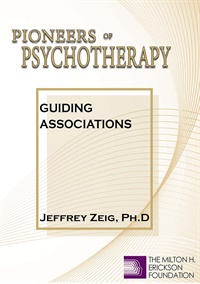
- Average Rating:
- Not yet rated
- Topic Areas:
- Clinical Demonstrations | Ericksonian Hypnosis and Therapy Techniques | Ericksonian Psychotherapy | Utilization | Humor | Hypnosis | Psychotherapy
- Bundle(s):
- Pioneers of Psychotherapy Bundle
- Categories:
- Pioneers of Psychotherapy | Evolution of Psychotherapy | Evolution of Psychotherapy 1995
- Faculty:
- Jeffrey Zeig, PhD
- Course Levels:
- Master Degree or Higher in Health-Related Field
- Duration:
- 00:57:00
- Format:
- Audio and Video
- Original Program Date:
- Dec 14, 1995
- Short Description:
- Zeig (1995) demonstrates the Ericksonian approach to psychotherapy while working with Carol, a woman whose nail-biting habit is rooted in anxiety. After gathering information on her personal history, Zeig helps Carol utilize her values and history to affect change. The process is both humorous and dramatic. After working to change associations linked to the problem behavior, Zeig offers Carol an ordeal that will produce a "guaranteed cure." Hypnosis is offered as the "dessert", rather than the main course. Ericksonian approach to psychotherapy.
- Price:
- $59.00 - Base Price
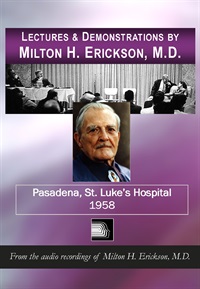
- Average Rating:
- Not yet rated
- Topic Areas:
- Clinical Demonstrations | Milton Erickson | Ericksonian Hypnosis and Therapy Techniques | Hypnosis
- Categories:
- Erickson Materials | Lectures & Demonstrations | Milton H. Erickson Collections
- Faculty:
- Milton H. Erickson, MD
- Duration:
- 7:01:11
- Format:
- Audio Only
- Original Program Date:
- May 02, 1958
- Short Description:
- Dr. Erickson does a lecture and demonstration at Pasadena, St. Luke’s Hospital 1958
- Price:
- $62.00 - Base Price
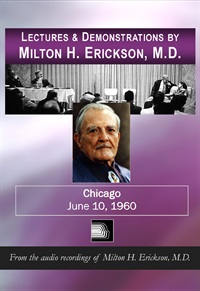
- Average Rating:
- Not yet rated
- Topic Areas:
- Hypnosis | Ericksonian Hypnosis and Therapy Techniques | Milton Erickson | Binds | Resistance
- Categories:
- Erickson Materials | Lectures & Demonstrations | Milton H. Erickson Collections
- Faculty:
- Milton H. Erickson, MD
- Duration:
- 3:57:01
- Format:
- Audio Only
- Original Program Date:
- Jun 10, 1960
- Short Description:
- During this seminar, Dr. Erickson describes essential skills for working with resistant patients, the use of permissive language, ordeal therapy, geometric progression, and therapeutic double binds. Erickson conducts a demonstration, answers questions from the audience, and elaborates on his thinking with case illustrations that include: sexual dysfunction, stuttering, bed wetting, childhood eating disorders, compulsive habits, phobias and self-defeating behavior.
- Price:
- $40.00 - Base Price
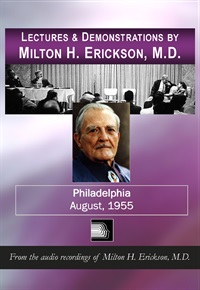
- Average Rating:
- Not yet rated
- Topic Areas:
- Hypnosis | Milton Erickson | Dissociation | Unconscious Processes | Ericksonian Hypnosis and Therapy Techniques
- Categories:
- Erickson Materials | Lectures & Demonstrations | Milton H. Erickson Collections
- Faculty:
- Milton H. Erickson, MD
- Duration:
- 2:17:27
- Format:
- Audio Only
- Original Program Date:
- Aug 01, 1955
- Short Description:
- In this set, Erickson communicates the timeless principles of hypnosis that he observed, discovered and utilized. He emphasizes the paramount importance of protecting the patient and establishing trust as the very foundation of the cooperative relationship characteristic of hypnosis. He stresses the importance of understanding the meaningful need of the patient and reviews, with many examples, the techniques of rehearsal, uncovering, dissociation, regression, time-distortion, revivification, visualization, orientation to the past and to the future, trusting the unconscious mind, and post-hypnotic suggestion.
- Price:
- $20.00 - Base Price
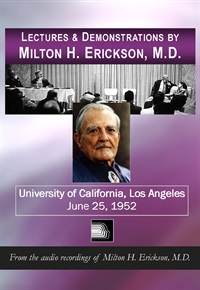
- Average Rating:
- Not yet rated
- Topic Areas:
- Hypnosis | Milton Erickson | Ericksonian Hypnosis and Therapy Techniques | Hypnotic Phenomena
- Categories:
- Erickson Materials | Lectures & Demonstrations | Milton H. Erickson Collections
- Faculty:
- Milton H. Erickson, MD
- Duration:
- 5:32:57
- Format:
- Audio Only
- Original Program Date:
- Jun 25, 1952
- Short Description:
- Five hours of instruction by Dr. Erickson on two general topics: Control of Psychological Functions by Hypnosis and Hypnotic Approaches to Therapy.
- Price:
- $62.00 - Base Price
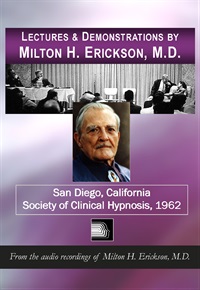
Lectures & Demonstrations of Milton H. Erickson, MD – San Diego - Society of Clinical Hypnosis, 1962
- Average Rating:
- Not yet rated
- Topic Areas:
- Hypnosis | Milton Erickson | Ericksonian Hypnosis and Therapy Techniques | Family Therapy | Pain and Healing | Sex and Sexuality
- Categories:
- Erickson Materials | Lectures & Demonstrations | Milton H. Erickson Collections
- Faculty:
- Milton H. Erickson, MD
- Duration:
- 5:29:03
- Format:
- Audio Only
- Original Program Date:
- Apr 29, 1962
- Short Description:
- Audio recording of Dr. Erickson describing essential differences between traditional hypnosis and modern hypnosis.
- Price:
- $50.00 - Base Price


